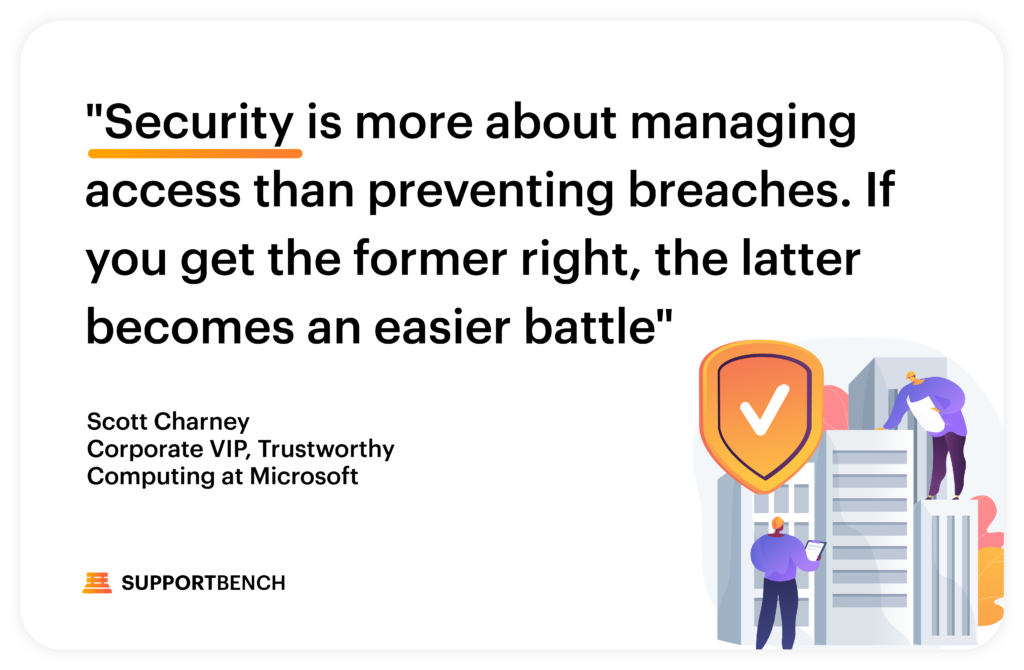In a constantly evolving digital world, businesses are becoming more intricate, necessitating tools and platforms that can support this growth. One of the features that’s becoming increasingly pivotal for support platforms is role-based security. As enterprise operations grow, so do their needs, and software platforms that can’t keep pace find themselves left behind. Interestingly, while many companies have started incorporating this feature, companies like Zendesk seem to have missed the memo. Let’s delve into the significance of this oversight and why businesses using Zendesk might find themselves at a disadvantage and how new platforms like Supportbench are setting the pace and defining how to deliver enterprise-ready, secure, and scalable customer support solutions.

Understanding Role-Based Security
Role-based security is a mechanism where access permissions are granted based on roles within an organization. For instance, a customer support representative may only have access to the ticketing system, whereas a manager can view team performance metrics and reports. This ensures data confidentiality, reduces human errors, and promotes efficient task management.
Why Might Zendesk Have Missed Out?
It’s surprising for a global leader like Zendesk to miss out on such a crucial feature. Here are a few speculations:
- Prioritization of Other Features: Zendesk might have been prioritizing other features and updates they deemed more urgent or in-demand at the time.
- Legacy System Challenges: Sometimes, introducing a new feature can be complicated due to existing legacy systems. Incorporating role-based security might require significant changes to Zendesk’s core architecture.
- Oversight: Simply put, it could have been an oversight, given the vast number of features and tools they manage.
The Consequences for Zendesk Users
Businesses that rely on Zendesk as their primary customer support platform might face several challenges:
- Data Security Risks: Without role-based security, sensitive data might be accessible to all users, leading to potential breaches or misuse.
- Operational Inefficiencies: In the absence of defined roles and permissions, there’s a likelihood of task overlap or confusion regarding responsibilities, hampering operational efficiency.
- Lack of Customization: Different businesses have varied needs. Without the ability to define roles and customize access, Zendesk might not be a one-size-fits-all solution for many enterprises.
- Regulatory Challenges: Certain industries have stringent regulations regarding data access. Without role-based security, companies might find it challenging to meet compliance requirements.
- Increased Training and Monitoring: Businesses will need to invest more in training their staff about data handling protocols. Plus, there’s the added cost of monitoring to ensure there’s no data mishandling.
Why Role-Based Security is the Future
- Enhanced Data Security: A clearly defined access protocol ensures only relevant personnel have access to sensitive customer data. And it most certainly reduces the chances of unintentional data sharing and leaks.
- Streamlined Operations: When employees have only the information they need, it reduces information overload, streamlining operations, and improving efficiency.
- Regulatory Compliance: With increasing data protection laws, role-based security ensures companies remain compliant by providing only necessary data access to employees.
Trends Support Leaders Can Capitalize On
- Embracing AI for Predictive Support
With AI-driven tools becoming more sophisticated, predictive support, where potential issues are identified and addressed before they become problems, is gaining traction. You can begin by analyzing customer interaction data to identify patterns. These patterns can help predict potential issues, allowing support teams to proactively address them. With AI-driven summaries, sentiment analysis, and intent detection, Supportbench makes predictive support a reality for businesses.
- Unified Communication Platforms
Support isn’t just about addressing issues; it’s about creating a seamless communication experience. Unified platforms that integrate chat, email, voice, and other channels are the future. You can simply migrate disparate communication systems to integrated platforms. This will not only improve response times but also ensure consistency in communication.
And of course, with its advanced email editor, chat widget, and ability to manage multiple email addresses, Supportbench provides a unified communication experience.
- Emphasis on Self-Service Portals
A 2022 Forrester report highlighted that over 60% of customers prefer self-service over speaking to a representative. You can invest in knowledge bases, FAQs, and chatbots that allow users to find solutions without human intervention. Once again, the KCS knowledge base and AI-driven chatbot built with ChatGPT technology make self-service a breeze for Supportbench users.
- Personalized Support Experiences
The age of generic support is over and today’s consumers expect support tailored to their individual needs. With the right platform, you an use AI-driven analytics to understand customer behavior, preferences, and history, allowing for customized support interactions. With features like dynamic SLAs, customer health scoring, and data-driven insights, Supportbench ensures every customer feels like the only customer.
- Employee Training and Skill Development
A knowledgeable support team is a company’s best asset. Continuous training ensures your team is equipped to handle every query. Simply establish regular training programs that emphasize both technical knowledge and soft skills. With 360-degree customer overviews in Supportbench, agents have access to all the information they need, bolstered by a platform that facilitates continuous learning.
As per a 2023 report by Varonis, 58% of companies have over 100,000 folders open to every employee. This alarming statistic demonstrates the dire need for structured access protocols. It’s not just about guarding against external threats but also about managing internal data access and security.
“Security is more about managing access than preventing breaches. If you get the former right, the latter becomes an easier battle,” remarks Scott Charney, Corporate VP for Trustworthy Computing at Microsoft.
Supportbench Filling the Gap
Supportbench’s role-based security isn’t just a feature; it’s an embodiment of understanding modern enterprise needs. Businesses, especially in the B2B enterprise domain, require sophisticated solutions that prioritize both functionality and security. Here’s how Supportbench stands out:
- Tailored User Experience: By defining roles, companies can provide a tailored dashboard and tool experience for their staff. This customization enhances efficiency and ensures that staff only accesses what’s relevant to them.
- Enhanced Data Protection: Role-based security acts as an internal firewall, preventing unintentional data breaches and promoting a culture of data consciousness.
- Operational Scalability: As businesses grow, so do their teams and operational complexity. Role-based security ensures that scaling doesn’t compromise security or operational efficiency.
- Building Trust: For clients and stakeholders, knowing that a business uses a platform with robust security measures builds trust. Supportbench, with its role-based security, not only benefits its direct users but also enhances the brand reputation of businesses employing it.
Supportbench isn’t just keeping up with the times; it’s setting the gold standard. While other platforms are playing catch-up, Supportbench has positioned itself at the forefront of the customer support revolution. The inclusion of role-based security exemplifies Supportbench’s commitment to providing unparalleled value. In an era where data is gold, Supportbench ensures that this gold is fortified behind robust, role-based security walls. And as the pillars of Supportbench reveal, this is just the tip of the iceberg.
In Summary
While Zendesk’s oversight in not incorporating role-based security remains perplexing, it’s evident that the feature is crucial for modern enterprises. In an era where data is a prime asset, ensuring its security and proper management is paramount. Supportbench’s commitment to delivering this feature, among its plethora of other advanced functionalities, firmly establishes its position as a frontrunner in the customer support software domain. Businesses looking to prioritize both efficiency and security will undoubtedly find Supportbench’s offerings resonating with their needs.










